Anthony McIntyre's Blog, page 1183
October 9, 2017
Reflections On Oglaigh na hEireann
 Is there a non-violent political alternative to Sinn Fein in the nationalist community, or will the dissident republican movement just have to bite the bullet and go 100% democratic if Fianna Fail and the SDLP cannot reach an accommodating merger rather than a shotgun marriage? In his latest Fearless Flying Column, controversial political commentator, Dr John Coulter, reflects on his reporting of the dissident republican terror movement and asks how it can become a credible mainstream nationalist party.
Is there a non-violent political alternative to Sinn Fein in the nationalist community, or will the dissident republican movement just have to bite the bullet and go 100% democratic if Fianna Fail and the SDLP cannot reach an accommodating merger rather than a shotgun marriage? In his latest Fearless Flying Column, controversial political commentator, Dr John Coulter, reflects on his reporting of the dissident republican terror movement and asks how it can become a credible mainstream nationalist party. Collapse Stormont and we’ll stop the terror! I remember that terrifying quote from the summer of 2010 as if it was yesterday.
I’d been on a relaxing family holiday that year when a dissident republican source contacted me for an interview. That interview was published in one of the Dublin-based national newspapers under the chilling headline: “Terror won’t end till we smash Stormont.”
If the situation was not so serious with the current impasse, I’d make the childish jibe – the DUP and Sinn Fein have beaten you to that one!
That headline in late August seven years ago was the blunt message coming from my major dissident republican source in Oglaigh na hEireann.
The group, which has been responsible for many of the dissident republican terror attacks that year, was also adamant it was conducting a debate within republicanism on a way forward at that time. The finalised tactics could last three to four years.
The spokesman said in 2010: “Oglaigh na hEireann is a bit like the IRA in the 1970s. Our main objective is to bring down Stormont and all its corruption. This is pretty much the thinking in our organisation at the moment.
“But we will not stop with the collapse of Stormont. The rest is up for negotiation. If Stormont fails, it will also get rid of the Provo mentality.”
This was a reference to Sinn Fein’s peace strategy which then supported the power-sharing Executive and the Northern Assembly.
It was clear in 2010, the Oglaigh na hEireann spokesman viewed the collapse of Stormont as embarrassing Sinn Fein among the republican community. How that mentality has changed as Sinn Fein collapsed Stormont in January this year!
My ONH source said the organisation was set on devising a short-term, three to four-year campaign rather than the so-called ‘long war’ strategy, which he blamed on current Sinn Fein President and former West Belfast MP Gerry Adams, now a Louth TD.
“It was Adams who pushed for the long war, but that became MI5 inspired and it didn’t succeed,” I was told.
The ONH spokesman also alleged that the late deputy First Minister Martin McGuinness “was an MI5 agent from an early stage”.
He alleged Mr McGuinness, a self-confessed, one-time commander of the Provisional IRA in Derry at the time of the Bloody Sunday massacre, had been recruited by the then RUC Special Branch in 1972 and had begun working for the British.
“McGuinness tried to make a break, but was forced back. He has been working with MI5 for a long time,” he alleged. Sinn Fein and Martin McGuinness have both told me to my face this allegation is totally untrue.
The ONH spokesman denied there was any rivalry between the various dissident republican factions as to who was operating more successfully.
As well as ONH, dissident republicans also include the Real, New and Continuity IRAs as well as an even smaller faction known as the Irish National Republican Army. During the following years, I was to have interviews published in the print media with the Real IRA, New IRA and Republican Action Against Drugs.
The ONH source added to me in 2010:
No one dictates to anyone else. It is whoever can pull off the best. We have settled for different groups and it is safer to have a cell structure. There is healthy competition between us, but no animosity. There is certainly not the situation as existed between the Provos and the Stickies. There is a debate going on within our movement at the moment on tactics and a way forward, and this hasn’t been completed yet.
At that time, the ONH source also appeared to pour cold water of the level of alleged negotiations between the London and Dublin Governments and dissident republicans on bringing about a ceasefire.
Former Deputy First Minister McGuinness had been adamant in 2010 that such talks were taking place – claims hotly denied by both Governments.
Speaking in the 2010 published interview, the ONH source told me:
There’s feelers going out and people have been approached, but it’s at an early stage. I know people whom our people consider to be MI5 who are living among the local population. How genuine they are, we are not sure. There are people who are MI5 and MI6 who are being talked about. They are making clumsy approaches to us, as if by accident. But there are too many people who have been around for too long. There are approaches, but the Governments are keeping far enough away. I think they are trying to weigh people up as to who can and who can’t be dealt with. Can they take out people by hook or by crook and take over the leadership. We’ve seen this happening before on the 1970s and there is a clear pattern. We are very wary of such approaches. Oglaigh na hEireann is the main group. They have been the IRA since the 1920s. We are not interested in a vote. We have evolved politics to the Left. At local level, we would support councillors who were Left-wing.The source would not be drawn if ONH was developing a political wing in the same way that the Continuity IRA had links to Republican Sinn Fein and the Real IRA was linked to the 32 County Sovereignty organisation.
He would also not be drawn if council candidates supporting the ONH strategy would contest the May 2011 planned local council elections in the North. So far, I’m not aware of any serving councillor or candidate from that period openly supporting the policies and strategies of ONH.
He added:
We see Oglaigh na hEireann as the cutting edge of the movement. Politics have only been used by others to promote themselves and we see that as a total failure. Initially, Oglaigh na hEireann had a core of people who were at the wrong scale of things, that is, in their 30s to 50s. We are now targeting young people and are having a certain amount of success, but it is taking longer than we thought. I would say about half our membership is now young people and the young militants are told to stay away from public activities, such as protests. By fair means or foul means, we will bring down Stormont. There are people who would push politics, but we are not political. We want a three to four year intensive campaign, but we realise the difficulty in organising this. Perhaps we will do things now and again to keep things going, although we realise that in recent months things have been stepped up. We would be content for something to happen every two to three months, but we are interested in stepping things up. We want the military campaign to destabilise Stormont.We did play the Orange card, too. We feel we had the prisoner successes at Maghaberry jail. We used it as a success because we did not attack the Orange parades.
The ONH source also commented on the past Police Ombudsman’s report on the 1972 Claudy massacre in which nine people were killed in three no warning bombs.
Although the Provisional IRA did not claim responsibility for the blasts, the massacre was blamed on the IRA. A local Catholic priest, the late Father James Chesney, was identified as a senior IRA operative in the massacre.
The ONH source said:
It was clear Claudy was used to take the heat away from Derry. But the target should have been Coleraine. County Derry had to co-operate with Derry to do something. Claudy was a silly thing to start with. Martin McGuinness was involved as well. He was in Derry right up to the time of Claudy. Father Chesney was sacrificed as he was one of 20 people involved.
While Father Chesney was later transferred out of the region to a parish in Donegal, the ONH source said he could not rule out that the priest had been murdered by British intelligence when he supposedly died of cancer in 1980.
The ONH source claimed another priest had been secretly murdered by British intelligence because he was suspected of being an IRA member, and an innocent person was murdered in a hospital bed by British intelligence who mistook the person for an IRA operative.
This interview with the ONH source took place in County Antrim and concluded with the source stating: “There is a debate on the direction of the organisation, but I don’t know how long that will take.”
Seven years later as I was reflecting on that interview, I wondered what set of circumstances need to be in place whereby ONH will follow the Provisionals into the political arena. It was clear from that interview that a political route for ONH is out of the question, but never say ‘never’ in Irish politics.
My reflections drift back to 1981 when I was a young cub freelance with BBC Radio Ulster sent with senior colleagues to cover the Fermanagh South Tyrone Westminster by-election following the death of Bobby Sands MP. Owen Carron won that by-election.
As I recorded his victory speech in Enniskillen, you would be forgiven for thinking of the concept – bomb first, talk later. But Sinn Fein not only entered the political arena, it eventually operated a partitionist parliament at Stormont with the DUP.
If Sinn Fein can easily operate Stormont ministerial posts in a power-sharing Executive with Unionists, surely a set of circumstances can evolve where dissident republicans can be persuaded into the political framework and the position outlined in my 2010 ONH interview becomes redundant?
But then I suppose the same question was asked in 1641, 1688, 1789, 1841, 1916, 1919, 1940, 1956, 1969, and 1994 – what price peace in Ireland?
As a Unionist, who or what is the Oglaigh na hEireann terror group?
Formed in 2005 mainly from disaffected members of the Provisional IRA who disagreed with Sinn Fein’s participation in Stormont, the IRA ceasefires, and latterly with Sinn Fein taking its seats on the Policing Board.Its name roughly means Soldiers of Ireland and it is currently one of the most active of the dissident republican terror factions, overtaking the Continuity, New and Real IRAs in the number of attacks.Earlier in 2010, it critically wounded a Catholic police officer in Co Antrim when it used a booby trap bomb in his car.That summer, the group attempted to use a booby trap bomb against an Army officer in Co Down, and carried out a bomb attack on Derry’s Strand Road police station.Ironically, the title is also the official Irish language name for the Republic’s Irish Defence Forces.
➽Follow John Coulter on Twitter @JohnAHCoulter


Published on October 09, 2017 00:00
October 8, 2017
Cockroaches
 Anthony McIntyre reviews the second book in the Harry Hole detective series by
Jo Nesbo.
Anthony McIntyre reviews the second book in the Harry Hole detective series by
Jo Nesbo.
Harry Hole gets around. In his first outing as the creation of Norwegian crime fiction writer Jo Nesbo, it is Harry down under on the Australian beat. In Cockroaches the cocktail craving detective is to be found in Thailand where his task is to track down the killer of the Norwegian ambassador to the country. The diplomat was found knifed to death in a hotel in Bangkok. Others would describe it as a brothel.
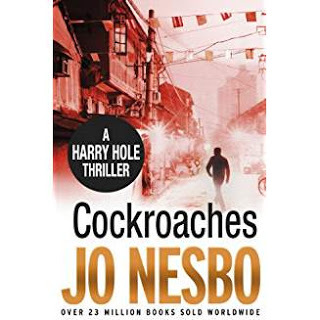
The Norwegian government is driven more by the need to hush up than by the desire to find the killer. It is concerned that a paedophile scandal might break and envelop it, particularly as it had just emerged from an earlier one. Although he is one of Oslo’s finest detectives, Hole was not despatched to Bangkok for detective purposes as much as diplomatic ones. The hope in Norwegian government circles is that his keen nose will follow the bourbon trail and that he will visit more bars than crime scenes. In Oslo when the decision to assign him the case is made, colleagues have to visit his favourite bar to retrieve him. By sending him off to Bangkok the objective is to sidestep accusations of official indifference. Not that the Thai authorities would be first in line to allege any such thing. They conspired with Oslo to shut down the investigation once it was clear Hole was on the trail of something other than bourbon.
If the late ambassador was involved in some paedophile ring, then that was not his only vice. He was deeply in debt to loan sharks over heavy losses sustained while feeding a gambling addiction. While there are probably more potential murderers than an experienced detective could shake a billy stick at, the choice of murder weapon and peculiarities of it strongly suggest the killer is not a Thai native but one of the ambassador’s compatriots. Still, Norwegians residents in Bangkok are not the only dangerous species. The Thai criminal fraternity is not sensitive towards killing Norwegian cops. All in a day’s work if needs must. With a corpulent killer on hand to flatten anyone who gets on the wrong side of his boss, Harry has an unpleasant experience handcuffed to the bottom of a swimming pool.
The picture painted by the author is of a Bangkok that is sordid and seedy. As with a lot of murder cases, prostitutes are attracted to them “like flies around a cowpat.” And because paedophiles, eager to avoid the shame in a country notorious for its vice industry ,“had become clever camouflage artists” , ripping away the veneer and poking beneath was part of the job.
It is not the type of novel Thai authorities would regard as an ad for their tourist industry: stifling climate, endless traffic jams, corruption, a vicious child sex industry, not to mention murder, scenic routes and landscape might find it hard to establish their reputation.
Having read the first novel there was no reason to expect Nesbo to disappoint. He didn’t. Because both these books were translated much later than subsequent books I was fortunate to have held off until I got the sequence right. some readers have complained about joining Hole on his journey long after it has started. while others were already too familiar with Hole and did not want to go back to his origins as a Nesbo character.
Although the central character he is not without able complements: some of the other players can claim a stake in their own right. The Bangkok female police chief, Liz Crumley is the product of Thai-American parentage. Persistent and helpful to the inquiry, the official reticence is not part of her psyche. The killer and the victim’s wife have their own back story, all of which injects doubt at key points and subverts the reader's confidence that they no longer need Hole to find the perp.
As with The Bat, Hole never seemed to be confronted with the problems thrown up by stranger anxiety in a foreign country. He goes in, makes the necessary contacts, does the job and leaves. How he can be so successful in faraway unfamiliar climes, stirs a longing to see Hole in his home territory. Scandinavian crime fiction should take place in darkened Scandinavia rather than in the super warm climes of Thailand and Australia.


Published on October 08, 2017 12:00
Blasphemy: The Selected Works of a Blaspheming Atheist
 An older piece from Michael Sherlock finds him in total opposition to blasphemy laws.
An older piece from Michael Sherlock finds him in total opposition to blasphemy laws.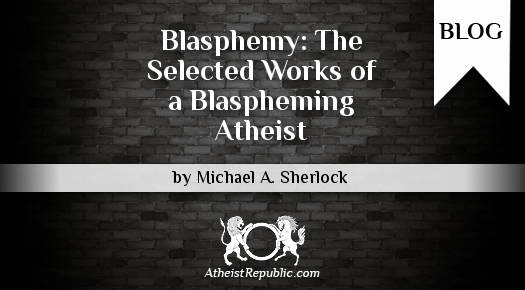
As well as being infused with seething and well-sourced blasphemies constructed in a manner to see just how far free speech can be taken, this book contains my organization’s (Human Rights for Atheists, Agnostics and Secularists) petition to abolish blasphemy laws, which has the support of Ricky Gervais, Richard Dawkins, D.M. Murdoch, Sam Harris, Roseanne Barr, and other notable celebrities.
Why is the Abolition of Blasphemy Laws a Necessity?
As our petition states:
Blasphemy laws are used to infringe upon human rights. They frequently lead to arbitrary arrest, detention, poor treatment in custody including torture, dubious legal procedures and poor application of justice. The definition of the offence can be left in the hands of police and judicial authorities. Governments have used blasphemy laws to silence political opponents. Individuals have fabricated blasphemy charges against others in communal disputes. Religious extremists have used blasphemy laws to attack opponents. Religious authorities have used blasphemy laws to impose orthodoxy on members of minority religious groups with the sanction of the state. And people accused of blasphemy have been subject to violence by unofficial mobs.
Isn’t This Book Just a Compendium of New Atheist Hate Speech?
Notwithstanding the fact that I don’t believe that there is such a thing as “New Atheism,” I do concede that this book does contain proactive and even provocative attacks on the Christian God Hypothesis, Jesus’ mother, the “Prophet” Muhammad’s brain, the Church, the Nazis, Communism, and theist propaganda in general. Having made this concession, I am very careful in my work not to brand believers with the same pen strokes I use to antagonize their belief systems. As I said in my reply to the charge of inspiring the Chapel Hill shooting:
Very few people seem to be able to distinguish between criticising religious doctrines and beliefs and attacking people. For example, if I criticize the Second Amendment of America’s Constitution, I am not saying all Americans are violent gun nuts, nor am I in any way inciting violence against Americans. The same goes for my criticisms of Islam and religion in general. If I object to Surah 4:34 of the Qur’an, and argue that teachings that assert men as the rulers of women and that endow husbands with the liberty to beat disobedient wives, I am not saying all Muslims follow this teaching, nor am I inciting hatred or violence against Muslims. However, given that quite a few people seem to lack the intellectual wit to navigate the nuance between attacking beliefs and doctrines, and attacking people, I make a point of constantly reiterating this distinction on my Facebook page, in my articles and books, and on Twitter.
For example, a post I commonly recycle on both Twitter and Facebook reads as follows:
…I do not believe that most Muslim men beat their wives in accordance with Surah 4:34, nor do I think that the majority of Muslim women living in secular societies are downtrodden and unhappy. I don’t think that most Christians are completely foolish, hateful and bigoted, in fact, I know many highly intelligent Christians. The majority of religious people that I have had the pleasure of knowing in my short lifetime have been very nice. I have shared the hookah and eaten bacon during Ramadan with Muslims friends; I have enjoyed dinner with numerous Christians from numerous denominations and attended many Hindu festivals and ceremonies.
Most of my friends belong to one religion or another and all of them are completely cognisant of what I think of their respective religions, but needless to say, they rarely engage me in dialogue about them. The reason I am an anti-theist/atheist is because I am first and foremost, a humanist, and the truth is these religions are uncritically accepted, believed and followed, they have the potential to do great harm and that potential is realized all across the planet on a daily basis. These religions have put the largest portion of our species to sleep, causing them to live an entire life on autopilot. So, I am not anti-Muslim, I am anti-Islam. I am not anti-Christian, I am anti-Christianity. I am a humanist anti-theist and this compels me to ferociously attack religion, but sadly, many mistake my attacks on beliefs and belief systems for misanthropy, so I just wanted to qualify my anti-religious ravings.
Excerpt from Blasphemy: The Selected Works of a Blaspheming Atheist.
Hitler – Onward Christian Soldier: Conclusion
‘It is clear to anyone who has eyes to see the mass of evidence available, that the rotten fruits of Nazi anti-Semitism were the direct result of Hitler’s either sincere infatuation with, or crafty exploitation of, the poisonous tree of the religion he publicly and passionately advocated, Christianity.
You are more than welcome to continue asserting that Hitler was an atheist, and that atheism, with its non-existent doctrines and its non-existent set of beliefs, caused Hitler to commit his atrocities, yet you may not do so with the assistance of any kind of rational or reliable evidence, for the evidence available eviscerates such a ridiculous and counterfactual claim. Hitler publicly professed a devotion to the religion of Christianity, as well as expressing an infectious animosity toward atheism, and whether or not he did so for political gain is inconsequential, for the fruits of his regime were in complete concordance with close to 2000 years of Christian tradition, right down to his brutal campaign against those “Christ-killing Jews.”
I sincerely hope you enjoy this book and I look forward to reading your reviews.
Sincerely,
Michael A. Sherlock


Published on October 08, 2017 01:30
October 7, 2017
Encouraging Signs Of Growing Unity Among Progressive Forces
 Tommy McKearney reproduces an article in his own blog that earlier featured in Socialist Voice. He is somewhat positive about the prospects of the Left gelling.
Tommy McKearney reproduces an article in his own blog that earlier featured in Socialist Voice. He is somewhat positive about the prospects of the Left gelling.Beware of the Trade in Services Agreement (TISA)
A recent feature in the Financial Times might cause some surprise among Ireland’s eight thousand homeless, or the many others struggling with the spiralling cost of renting even modest accommodation.
The article reported that the Republic is now enjoying one of the most remarkable economic revivals the European Union has seen, and that the country’s sovereign borrowing costs are now the same as those of France.
This piece of good news, for some at least, was part of a recent “Person in the News” article that gave a glowing account of the new Taoiseach, Leo “early rising” Varadkar.¹ The article contained the type of trite nonsense more often produced by Varadkar’s social-media spin machine. Young, handsome, clubbable, assertive prime minister, and—wait for it—“probably more centre-right as opposed to the non-ideological person which Enda Kenny was.”
Well, there you have it: journalistic licence at its most unperceptive. To speculate that any leader of Fine Gael could possibly be “non-ideological” requires a lively imagination, but to suggest that Leo Varadkar might be centre-right is to do a hard-line neo-liberal a grave injustice.
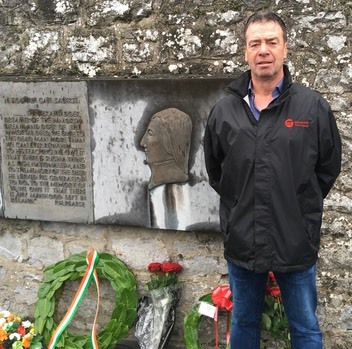 Above: John Douglas, general secretary of Mandate, main speaker at united commemoration for Wolfe Tone in Bodenstown on 20th August 2017
Above: John Douglas, general secretary of Mandate, main speaker at united commemoration for Wolfe Tone in Bodenstown on 20th August 2017For almost three decades after the beginning of the Thatcher-Reagan era’s onslaught on working people’s rights and entitlements, capitalist ruling classes everywhere were able to maintain control and hold the political high ground.
They achieved this through a combination of factors. The collapse of socialist states in eastern Europe removed the threat of a competitive alternative. Their control of media and educational institutions granted the world’s oligarchs an almost uncontested telling of the political and economic narrative. Moreover, the creation of unlimited and ultimately unsustainable credit provided an illusion of prosperity and dynamism that offset opposition from the left, or indeed words of caution from the small number of critical classical free-market economists.
The political calm enjoyed and exploited by capitalism’s elite ended with the economic crisis heralded by the collapse of Lehman Brothers and the subsequent imposition of what is euphemistically called austerity. Working people in Europe, the United States and elsewhere reacted angrily to a brutal attack on their standard of living and challenged the legitimacy of the status quo. While the response over the entire spectrum of the working class has not always been progressive, it is nevertheless of concern to the ruling elite.

Consequently, we are now seeing the emergence of a twin-track strategy from within capitalism. Firstly, there is the emergence of reactionary politicians posing as non-ideological centrists. Leo Varadkar and the promotional propaganda he generates exemplify this phenomenon in Ireland.
Secondly, and almost invisibly, there is a subversive and corrosive campaign to legislate for and implement free-market trade agreements beneficial only to global corporate giants. While Donald Trump spoke loudly during his presidential campaign of ending such agreements, he has not made good on his boast since arriving in the White House. Although he stalled development on the Transatlantic Trade and Investment Partnership (TTIP) between the EU and the United States and the Trans-Pacific Partnership (TPP), almost all other trade deals remain in place.
And now, in another spectacular U-turn, his associates are intent on resuming negotiations in September on a pernicious treaty called the Trade in Services Agreement (TISA).
State-appointed delegates from twenty-two countries, together with the EU, represented by its Commission, have been meeting in secret in Geneva since 2013. Regrettably, the Irish state is complicit in this scheme, about which the EU’s own web site says: “Like any other trade negotiations, the TiSA talks are not carried out in public and the documents are available to participants only . . .”
What we do know is drawn from leaked sources obtained by the International Trade Union Confederation and published in a report, “All About TISA.”² This report tells us that TISA would (a) lead to a massive transfer of power from governments to transnational corporations, (b) lead to strangulation of the regulation of banks and finance, and (c) hasten the “Uberisation” of many more jobs.
Moreover, there is heavy emphasis on an all-encompassing locked-in clause, which simply means that, once enacted, there would be no retracting any aspect of the treaty.
Any such trade pact would have detrimental consequences for Ireland. Not only would transnationals, such as Shell and Apple, gain increasing influence within the state but also our already limited ability to control the financial sector would disappear completely. Interestingly, Scott Sinclair, a senior researcher with the Canadian Centre for Policy Alternatives, now argues that TISA would also make it harder for governments to regulate vital services, such as energy and water³—a barely visible clause that would potentially offer the Varadkar-led Fine Gael–Fianna Fáil axis a vehicle with which to reverse the gains made by the campaign against the water tax.
As a Swiss trade unionist recently said, despairingly, if this treaty is implemented national parliaments become virtually irrelevant, and popular sovereignty is grabbed by transnational capital.
Fortunately, though, all is not lost, and there is an answer to our difficulties. The above-mentioned water campaign provides a lesson in how to organise a peaceful and democratic mass movement capable of foiling the designs of neo-liberalism.
Moreover, we have witnessed recently the beginning of an encouraging and indeed significant coming together of crucial progressive forces. Rallying under the slogan Unity of our people, unity of progressive forces, unity of our country, communists, republicans and trade unionists came together to hear a leading trade unionist, John Douglas, deliver an inspirational oration at the grave of Theobald Wolfe Tone.
A central theme of the speech was the need to build a progressive movement in order to reverse the damage done by neo-liberal austerity in general and to prevent specific attacks on workers, such as the TISA treaty. “There is an untapped hunger for change and justice in Ireland that we need to give expression to,” he said, “. . . and we can only do this through the unity of progressive forces.” He went on to add: “Our task now is to build from the ground up, to educate, to agitate. We need to build a movement that is capable and confident and which grows with every victory.”
John Douglas has undoubtedly got it right. To build a movement sufficiently confident and capable of opposing and overcoming the neo-liberal agenda we must create unity among progressive forces. The recent united commemoration for Wolfe Tone was not only a positive first step along this road but indicated the real potential that exists.
Evidence of success will be when a future Financial Times “Person in the News” article publishes the story of a leading Irish trade unionist who is causing as much distress for capital as Varadkar is providing for its comfort today.
This article first appeared in Socialist Voice Sept 2017
1. Laura Noonan, “The bright young man leading an Irish revival,” Financial Times, 19 August 2017.
2. (a) International Trade Union Confederation, “All about TiSA” (www.ituc-csi.org/all-about-tisa); (b) further information is available on the UNI Global Union web site (http://bit.ly/1Qlw9xf).
3. Scott Sinclair, “TISA Troubles: Services, Democracy and Corporate Rule in the Trump Era,” Rosa Luxemburg Institute (www.rosalux.eu).


Published on October 07, 2017 09:00
Radio Free Eireann Broadcasting 7 October 2017
 Martin Galvin
with details of this weekend's broadcast from
Radio Free Eireann.
Martin Galvin
with details of this weekend's broadcast from
Radio Free Eireann.
Radio Free Eireann will broadcast this Saturday October 7th on WBAI 99.5 FM radio or wbai.org at 12noon New York time or 5 pm-6pm Irish time or listen any time after the broadcast on wbai.org/archives.
Author and former Republican political prisoner Richard O'Rawe will give an extended interview on his new book In The Name Of The Son: The Gerry Conlon Story.
This book, with a Foreword by movie star Johnny Depp, tells of Gerry Conlon's triumph over being doubly shattered first as a victim of a miscarriage of justice, one of the Guildford Four, and then by riches, Hollywood celebrity and guilt. Listeners will remember Gerry Conlon as a frequent guest on Radio Free Eireann, but the book also highlights the efforts of our deceased former co-host Sandy Boyer.
By special arrangement with publisher Merrion Press, the first ten listeners pledging $100 will receive copies.
WBAI depends on public contributions and uses listener support in determining its programming. Your support keeps Radio Free Eireann on the air!!!
Contributions in any amount can be made by calling 516-620-3602 during the program.
John McDonagh and Martin Galvin co- host.
Radio Free Eireann is heard Saturdays at 12 Noon New York time on wbai 99.5 FM and wbai.org.
It can be heard at wbai.org in Ireland from 5pm to 6pm or anytime after the program concludes on wbai.org/archives.



Published on October 07, 2017 01:00
October 6, 2017
Dilemmas
 Writing in Buncrana Together last month Enda Craig & James Quigley address:
Writing in Buncrana Together last month Enda Craig & James Quigley address:The Dilemma Of Paragraph 9.4, Our Democracy, The Oireachtas Water Committee And Right2Water Ireland
What exactly took place in the Oireachtas Committee on Funding Domestic Water that ended in highly controversial circumstances in April this year? There are many questions that members of the committee and politicians have failed to answer and that the mainstream media have not bothered to ask.
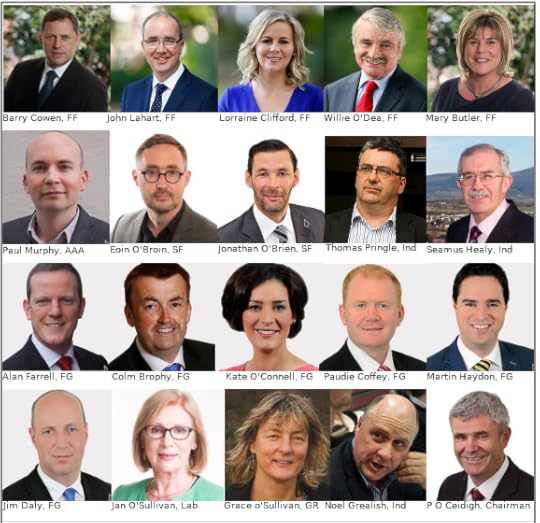 Twenty members of the Joint Oireachtas Committee on Future Funding of Domestic Water Services. Top two rows were professed anti water charges, anti metering and anti Irish Water delegates
Twenty members of the Joint Oireachtas Committee on Future Funding of Domestic Water Services. Top two rows were professed anti water charges, anti metering and anti Irish Water delegates<img src="https://static1.squarespace.com/stati..." alt="Oireachtas schedule, including Private Sessions, from the Oireachtas Final Report April 12, 2017.
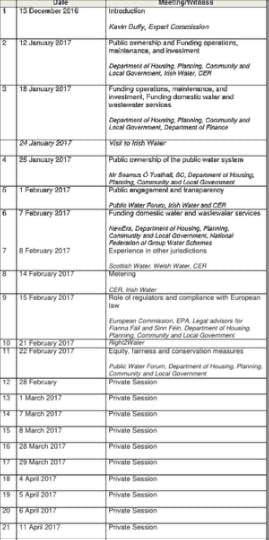 Oireachtas schedule, including Private Sessions, from the Oireachtas Final Report April 12 2017.
Oireachtas schedule, including Private Sessions, from the Oireachtas Final Report April 12 2017. The short answer is: there are many, many unanswered questions and we don’t know exactly what took place. It's like a wall of silence has been erected and any mention of paragraph 9.4 or what went on in the many Private Session is taboo.
For example, we don’t know what influence Minister Simon Coveney or the Eu Commisioner Vella’s threats had on the process. We don’t know whether Fianna Fáil reneged on promises, whether to Fine Gael or to the anti water charges members. We don’t know why the Right2Water committee members appeared on the Dáil plinth on April 6th and prematurely hailed the draft report a victory. We don't know whether the Right2Water bartered away some key demands.
And the biggest conundrum of all is we are unclear whether the committee members, especially those professed anti water charges, anti metering and anti Irish Water Ltd members, agreed with the 'Confidential Draft Report' of April 5th, even though there was no mention of Paragraph 9.4 of the Water Framework Directive 2000/60/EC and most importantly no mention of invoking this paragraph in Ireland’s second River Basin Management Plan.
Honest Information Is Hard To Come By
Even after emailing the chairman Pádraig Ó Céidigh, querying committee members and last but not least our numerous requests from Right2Water Ireland, we still are unclear how exactly the ‘Draft Report’ came about or whether it’s contents were agreed by the members of the committee.
However, we do know that there were many claims and counter claims after April 5th, with Fine Gael accusing Fianna Fáil of going back on promises and Sinn Féin accusing Fianna Fáil of multiple turnarounds and Fianna Fáil denying any of it.
After a phone conversation with the committee secretary Tom Sheridan who told us that the contents were agreed by the members and that is how the process works, we are gravitating towards some kind of committee member's agreement with the contents of the controversial draft report. However, the only confirmed fact at the moment is not one member of the committee objected to the omission of 9.4 in the draft or final reports.
Surely it is our right to know what this committee and it’s members got up to and not rely on hearsay or misinformation. Basic information like what exactly did they agree or barter away during all those private sessions, especially the last ten private ones from February to April, should be readily available? It is not and no one wants to talk about it.
As mentioned in our earlier article we have a big problem with this committee’s protocol and the numerous private sessions. Who drafted t he contents of the ‘confidential draft report’ and why was the most important issue, that of Ireland’s ‘Established Practice’ enshrined in the EU Water Framework Directive, paragraph 9.4 , not included? Did the committee’s officials decide not to include it? Or did the members themselves agree the contents of the draft report including the omission of any mention of paragraph 9.4. In other words, in both scenarios, was it a deliberate omission? After all that went on during a full day’s debate on February 15th and the importance Chairman Ó Céidigh gave to the debate, it should have been included.
Because of the importance of the 9.4 paragraph to Ireland any member of the committee who supported anti water charges and anti metering should have been up in arms over the omission. There wasn't even a whimper.
A recent email that came our way, (see below) written by Alan Brynes and addressed to all committee members and the secretariat, including the chairman Pádraig Ó Céidigh, confirms the existence of this ‘confidential draft report’. We say this because even some in Right2Water are denying it's existence.
In a phone conversation with a committee secretary we were told that the contents of this report were agreed by the committee members. If this was the case, then it follows that the members of the committee agreed not to include paragraph 9.4 or any mention of the River Basin Management Plans or any mention of February 15th debate. What corroborates this conclusion is the total lack of criticism about the omission from any member of the committee and their absolute silence afterwards.
Draft Report email from Oireachtas secretary to Committee members April 5th 2017
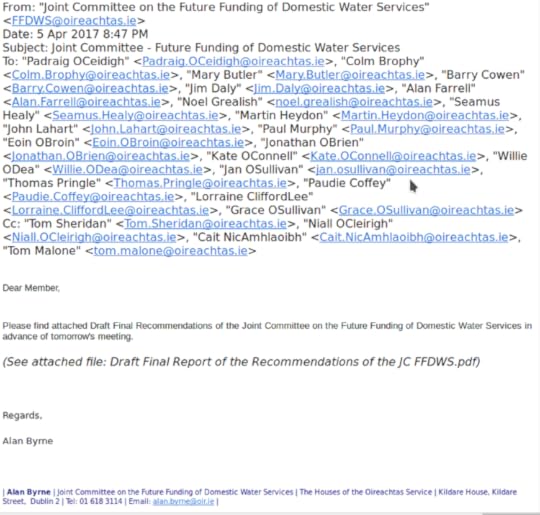 Link to confidential draft report
Link to confidential draft report
Paragraph 9.4
This is the paragraph in the The EU Water Framework Directive (2000/60/EC that enshrines Ireland’s ‘Established Practice’ into European law. It was transposed into Irish law by the European Communities (Water Policy) Regulations 2003 (S.I. No. 722 of 2003). Paragraph 9.4 was negotiated by Fianna Fáil , the government of the day in 2000, who were forced into it by past successful anti water charges’ campaigns. Hence it was called the ‘Irish Exemption. The paragraph is undoubtedly Ireland’s best defense against the EU Commission forcing water charges and metering through, in any shape or form. It must be invoked in the second River Basin Management Plan which will be sent to Brussels on the last day of this year.
Another little bit of information is that the Irish Government is not obliged by EU law to bring in water charges and paragraph 9.4 of the Water Framework Directive 2000/60/EC establishes this. However, we believe that this paragraph and any form of water charges are mutually exclusive.


Published on October 06, 2017 12:30
A Climate of Fear
Christopher Owens with another in a series of excellent reviews reflects on:
A Climate of Fear: The Murder of PC Blakelock and the Case of the Tottenham Three - David Rose
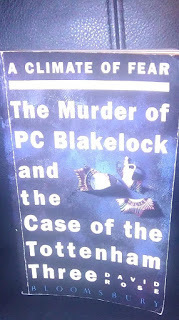
First published in 1992, this tale of institutionalised racism, police corruption and a miscarriage of justice has not gathered the long lasting notoriety often bestowed upon the cases of the Guildford Four and Birmingham Six.
There are undoubtedly a number of reasons for this, mainly to do with how English society views the forces of law and order, class and race. Plus the appalling case of Stephen Lawrence (and subsequent Macpherson Report) have somewhat superseded it by going even further in what we already knew about the police, but few people in the media (beforehand) were prepared to discuss.
Former Observer journalist David Rose has fallen out of favour in a number of circles, due to his questionable articles on climate change and his initial belief of a link between Al-Qaeda and the regime of Saddam Hussein. But there can be no denying of his sterling work in highlighting the troublesome nature of this case.
He places the Broadwater Farm riot (and subsequent murder of Keith Blakelock) as the logical conclusion of a series of confused policing policies from the Metropolitan Police that frustrated both the local community (specifically the black community) and the ordinary officers who patrolled the area daily.
When interviewing Winston Silcott (jailed for being the ringleader of the Blakelock murder but had his conviction quashed), it's heartbreaking to read about the impact that racism in English society had on him and his friends. Broadwater Farm resident Stafford Scott's tale of being put in a class of lesser ability (despite his academic flourishes) and being denied a place in the RAF because of a 'sus' arrest over nothing is genuinely enraging.
The infamous 'sus' (search under suspicion) laws gave way to "special techniques" when it came to policing what the then Chief Constable of the Met Kenneth Newman had described as "symbolic locations." Drawing on his experience in the RUC, Newman effectively believed that policing areas with a heavy black population (most of them youngsters born in England) was the same as policing an Irish nationalist area.
Leaving aside the obvious cultural and political differences, the fact that a Chief Constable honestly believed that English citizens and IRA volunteers were not dissimilar is a highly disturbing point of view.
However, by throwing community policing into the mix as well, this led to (in the eyes of officers across the board) compromises with local criminals in an attempt to avoid confrontation. But the black community were still describing (at best) insensitive policing. It's clear this was only going to end in disaster, and the death of Cynthia Jarrett was the trigger.
Naturally, both sides disagree with the details. But it cannot be overlooked that the police (without a search warrant) entered a premises with a set of keys taken from a suspect (who turned out to be innocent) and without announcing themselves. Rose questions why the police officers involved weren't suspended and questions how much the police had downplayed their treatment of Mrs. Jarrett.
Rose is a concise and direct storyteller. He places events in the proper context (discussing the trial and the initial appeals in what he calls the "pre Guildford Four" climate), is able to detail the horror of what happened to Winston Silcott, Mark Braithwaite and Engin Raghip while also making sure readers bear in mind the horror of what happened to Keith Blakelock (the depiction of the immediate aftermath is so stark that the horror is even more pronounced).
Rose points the blame at all aspects of English society: the local councils for allowing Broadwater Farm to become a "sink" estate, the police for their heavy handedness (among other things), the press for whipping up racist sentiments (and for gross contempt of court) and the judiciary for their unwavering belief in the concept of police infallibility.
His depiction of the subsequent investigation, where children as young as thirteen were detained without access to parents or solicitors and pressurised into signing statements implicating certain people fills the sensible reader with utter anger and dread. Although it's quite commonplace in 2017 mainstream thinking to distrust the police, reminders like this take the breath away at the sheer audacity of their systematic abuse.
Long overdue an update and a repress, A Climate of Fear serves as a warning for future generations to never let such outrages happen again. As Derek Hodgson (who prosecuted the Tottenham Three) says in regards to the right to silence: "You must keep it. The innocent in our system have a lot to fear."
David Rose 1992 A Climate of Fear: The Murder of PC Blakelock and the Case of the Tottenham Three Bloomsbury Publishing ISBN-13: 978-0747511847.


Published on October 06, 2017 00:00
October 5, 2017
Catalan Bid For Independence In Line With The Rights Of Nations
The Thomas Ashe Society Omagh backs the Catalan call for Independence.

Following Sunday’s independence referendum in Catalonia, passed by overwhelming majority but whose legitimacy is being contested by Spain, the Thomas Ashe Society Omagh extend our full support to the Catalan people as they continue their march towards nationhood. Through their dignified actions, including the non-violent response to the Spanish state and its shameful aggression, the Catalans have won their rightful place among the nations of the world.
The events in Catalonia are a reminder of our own situation in Ireland, where we likewise seek to determine our own affairs – a right denied us by the British state and its continuing occupation of the Six Counties.
The British Government’s sovereign claim here denies the fundamental right of our people to national self-determination. It is in breach of the internationally accepted right of nations to self-determine and, as such, should be withdrawn, allowing all of the Irish people – together as one unit – to determine their own future and the Ireland they wish to live in.
Catalonia and Ireland, as all nations and peoples, have a shared right to peace, democracy and ultimately to freedom. We look forward to the day, yet to come, where we both of us enter into the great commonwealth of nations, standing together as free peoples before the world.
To echo The 1916 Proclamation, it remains our right, shared with the Catalans, to unfettered control of our nation and its destinies, a right held by that same Proclamation to be sovereign and indefeasible. In both Catalonia and Ireland, it remains the case.



Following Sunday’s independence referendum in Catalonia, passed by overwhelming majority but whose legitimacy is being contested by Spain, the Thomas Ashe Society Omagh extend our full support to the Catalan people as they continue their march towards nationhood. Through their dignified actions, including the non-violent response to the Spanish state and its shameful aggression, the Catalans have won their rightful place among the nations of the world.
The events in Catalonia are a reminder of our own situation in Ireland, where we likewise seek to determine our own affairs – a right denied us by the British state and its continuing occupation of the Six Counties.
The British Government’s sovereign claim here denies the fundamental right of our people to national self-determination. It is in breach of the internationally accepted right of nations to self-determine and, as such, should be withdrawn, allowing all of the Irish people – together as one unit – to determine their own future and the Ireland they wish to live in.
Catalonia and Ireland, as all nations and peoples, have a shared right to peace, democracy and ultimately to freedom. We look forward to the day, yet to come, where we both of us enter into the great commonwealth of nations, standing together as free peoples before the world.
To echo The 1916 Proclamation, it remains our right, shared with the Catalans, to unfettered control of our nation and its destinies, a right held by that same Proclamation to be sovereign and indefeasible. In both Catalonia and Ireland, it remains the case.


Published on October 05, 2017 11:30
RHI – Repugnant, Heinous, Invidious
 Brian Horner has something to say about the fall out from the RHI Scandal. Brian Horner has a background in the education sector and is now retired in the Portstewart area.
Brian Horner has something to say about the fall out from the RHI Scandal. Brian Horner has a background in the education sector and is now retired in the Portstewart area.In Hamlet, Marcellus, an officer of the palace guard, seeing the ghost of the dead king walking over the palace walls, observes, ‘Something is rotten in the state of Denmark’.
Fast forward a few hundred years and transpose the action to the deserted Assembly at Stormont. It isn’t too difficult to imagine those words being repeated on the hill today.
Repugnant. Heinous. Invidious. Yes, the Renewable Heat Incentive (RHI) scheme is certainly all that.
And now that the start of a public inquiry, chaired by Sir Patrick Coghlin, has been delayed for a month, some are wondering if something more sinister is at play here? Could this delay be setting the scene for the announcement of a settlement that will let the DUP off the hook?
Compounding these suspicions is the news that DUP leader and former first minister Arlene Foster has been given special rights at the inquiry. The "enhanced participatory rights" mean she has special access to witness statements.
So how has one of the biggest financial scandals since the formation of Northern Ireland been put on the back burner by the media, political commentators and political parties, while tax payers continue to foot the bill of a possible £1.2billion?
Those in Northern Ireland that signed up to the RHI scheme and were approved could pocket £160 for every £100 they spent on renewable fuels, such as wood pellets.
This means that an initiative that was meant to cost £25 million over five years will now cost £1.15 billion over 20 years, with the breakdown of money being covered by Treasury to the sum of £660 million, with Stormont landed with the remaining £490 million to pay.
Johnathan Bell, formerly of the DUP, was suspended in December 2016 for speaking to the press about the RHI scandal without party permission.
Mr Bell said he had been prevented from closing the RHI scheme by DUP special advisers, whom it later emerged may have had other reasons for wanting to keep the scheme open.
Bell went on to claim on The Nolan Show that a senior civil servant in the Economy Department told him that had the special advisers not interfered then the cost of the scheme could have been halved – Yes. You’ve read that correctly, halved.
He also told the public that he wrote to DUP leader Arlene Foster in March 2016 to tell her that special advisers were saying that the scheme be kept open and to outline a number of difficulties, but she refused to take the advice on-board – this was then described by Former DUP MLA David McIlveen as the RHI "omnishambles". He said at the time (January 2017) Ms Foster has "seriously misjudged" public anger over her parties handling of the RHI scheme.
The names at the centre of this continuing omnishambles are: Timothy Johnston (now DUP Chief Executive), John Robinson, Andrew Crawford, Stephen Brimstone and Timothy Cairns. These individuals all have one thing in common, they are all linked to the DUP.
Why aren’t the roles of these individuals made clear to us? Most of all, why are tax payers paying their legal fees of up to £200 per day, whilst some of them (if not all) are befitting from the RHI scheme?
Sir Patrick Coghlin has assured us (the public) that there will be a "detailed and intensive" investigation into the RHI fiasco. This is what we all want, but could anyone in the political or journalistic sphere give us an insight as to where this is all at?
Is there not a story in the fact that the benefactors of the RHI scheme could be getting their legal fees paid by the tax payer?
The delayed investigation is no excuse for the media or political commentators to shelve the story; tax payers’ anger shouldn’t be turned on and off at the whim of the media’s agenda.
We need to know where our hard-earned money is going. We need answers, but who will ask the questions on our behalf?
And the sooner the better.
➽Follow Brian Horner on Twitter @OtherBench


Published on October 05, 2017 00:00
October 4, 2017
Written With Brutal Honesty
 Reviewed by Mick Hall in Organized Rage, the latest book about the harshness of life on the Blanket protest.
Reviewed by Mick Hall in Organized Rage, the latest book about the harshness of life on the Blanket protest.Book Review: Truth Will Out, by Paul McGlinchey and Philomena Gallagher. Paul's story from childhood to freedom fighter and political prisoner.
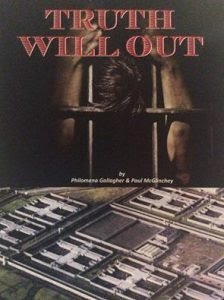
This little book is a very fine piece of work, I write little not because it's small in stature, it's far from that. It's because it is only 148 pages long, yet is one of the most informative books you're likely to read about the war in the north of Ireland and why young working class men and women from town and country joined Óglaigh na hÉireann, (PIRA) and why they were prepared to inflict and endure so much hardship and pain.
Paul begins with his childhood which in many ways was idyllic. He was born in Bellaghy, County Derry. Like all country boys he admits he did his share of mitching off school mostly in the potato planting and gathering season when they went out gleaning. His childhood was much the same as most working class children who lived in a village in the UK at that time. He played in the streets and surrounding fields. When his parents could afford a TV, he enjoyed watching the Lone Ranger, Circus Boy, Crackajack and Rin Tin Tin.
The coupling of the undemocratic and sectarian six county statelet which had resulted from the Partition of Ireland in 1922 and the rise of civil rights and liberation movements across the world tumbled many of Paul's generation into a maelstrom of bloody war.
The Northern Irish Civil Rights Association formed in the 1960's gained traction amongst the North's Catholic population during Paul's childhood. Rather than dealing with its just demands, the Unionist state believed they could cut it down. Once the British government in London decided to back the Unionist sectarian statelet against the minority population, the die was cast and set in stone for the next 30 years.
When the images of the violence inflicted on members of the NICRM by the B-Specials were broadcast across the rest of the UK they caused hardly a ripple. In Northern Ireland it was different and the Catholic and nationalist population were horrified. Many had seen the same sort of brutality inflicted on the US civil right marchers and now they saw much the same being inflicted on their young people on their streets.
Rather than dealing with the lack of civil rights which brought the protesters onto the streets, a Labour government in London sent the troops into the north in support of the status quo. They acted alongside the RUC to quell the rising tide of protest against inequality and sectarianism.
The Army wasn't sent into be independent arbiters as the Westminster government claimed, but to defend the sectarian state from imploding. In it's first months on the streets it worked alongside the hated B-Specials, who less than a year earlier had viciously attacked civil rights protesters in Derry.
Understandably this didn't go unnoticed by the minority population. The British army accompanied by the RUC seemed determined to act as a recruiting sergeant for the Provisionals. I will let Paul take up this pitiful tale as it typifies why young men and women of his and subsequent generations joined the PIRA and INLA:
The turning point in my life came in August 1972. Day was breaking when the British army with blackened faces smashed down our front door raced up the stairs and rushed into our bedrooms with guns and strong flashlights forced into our faces. They were shouting and swearing at us my younger brothers and sisters were squealing with fright. My Mum and sister Ann were crying, she begged the army to tell her what we had done. They cursed her and pushed her aside. Me, I could only stand and stare at them. I was standing there in my underwear trembling not from cold but with pure anger and frustration at not being able to help my family. One of the soldiers threw me against the bedroom wall and put the butt of his rifle within inches of my face. I do believe he would have smashed it into my face, it was only my mothers piercing scream No' No! Please, he's only a child which prevented him.
Paul, like countless young people in the North, who had similar experiences reached out for the nearest vehicle to fight back with. It was almost inevitable he turned to the PIRA. While it had been almost dormant outside of Belfast and Derry since its 1950s campaign, there is absolutely no doubt the British State's failure to respond to the genuine grievances of the NICRM put wind in it sails.
On his 17th birthday, when other young boys across the rest of the UK were going to dances, clubs, chasing girls and enjoying some dope or beer, he joined the IRA. His other brothers who were all there on the morning when the British army crashed through the door of what had been until then a happy home also went on to join the Provos.
Dominic, Paul's elder brother gained a fearsome reputation as a soldier. Another brother Sean, at 17 became the youngest volunteer to get a life sentence.
When the boot of a British squaddie kicked the McGlinchey door in on that fateful morning the life of this family changed irreparably
In 1976 Paul was arrested and sentenced by a Diplock no jury court to serve 14 years in prison.
Paul describes this in his book:
I was sent from the court to Long Kesh and handed prison clothes after being stripped of my own clothes. I insisted I was a political prisoner, not a criminal and I refused to wear the prison uniform. I was then transported naked to the H-Blocks where I joined the other protesting republican. Next morning I was sent to H5, again naked. With me it was a personal judgement. I was not a criminal, never stole or done a wrong thing in my life.
On the second day after his arrival he had his first introduction to the brutal and sadistic prison regime. When he refused to call prison officers Sir, he was beaten unconscious.
He writes:
I lived in constant fear, especially from two screws, one nicknamed Rhinestone cowboy because of the way he walked. I was convinced they were both mad, completely insane with hatred. They frothed at the mouth when beating me. They could not beat me viciously enough. They took pure joy in it. Wing shifts were really terrifying. Every prisoner was terrified of the brutal beatings to come. Many of the prisoners took diarrhoea with nerves at the prospect of what was in store for them. The further your cell was up the wing the more nerve racking the waiting was. The sound of cell doors being opened and roars of run you fucking Provo, you Fenian bastard, mixed with the yells and cries of pain. Counting each cell door, knowing that your door was the next was unbearable fear and pain.
He writes with brutally honesty about the fear he and other republican prisoners experienced when prison officers came to give them yet another beating. Paul, a Roman Catholic, describes his religion as a rock which helped him deal with the brutal treatment he and his comrades received. Although he is less generous about the Catholic priests who acted as prison chaplains in the jail.
He and his comrades were no saints. Like all soldiers in time of war, they inflicted pain and suffering on others. But they were soldiers, thus entitled to prisoner of war status. The British government had recognised this in 1972, when William Whitelaw introduced Special Category status for Republican volunteers who had been interned or imprisoned by the courts in Long Kesh. This meant Republican prisoners were allowed free association, extra visits, food parcels and could wear their own clothes. It also meant the prison staff recognised their command structure.
As Paul writes:
With a swipe of a pen you were no longer political prisoners but a common criminal. The British government single biggest blunder throughout the years of war was to remove political prisoner status and it's mishandling of the blanket protest. The failed to understand the determination and resolve of Irish republican people and prisoners of war past and present.
Indeed, the British government all but admitted this when after the 1981 hunger strikes ended they eventually conceded the Republican prisoners demands.
1. The Right not to wear a prison uniform;
2. The Right not to do prison work;
3. The Right of free association with other prisoners;
4. The Right to organize their own educational and recreational facilities;
5. The Right to one visit, one letter and one parcel per week.
The latter part of the book deals with the 1981 hunger strike, the role the outside leadership played in calling it; they were against it according to Paul. How Catholic priests undermined the Hunger Strike and how it came to an end.
He writes:
With the hunger strike ending as it did, a sense of relief and despair set in. Relief that no more comrades would die and despair that ten had died. Yet, everyone throughout the world now knew of Bobby Sands and the H-Blocks and recognised us as political prisoners. Thatcher the 'iron lady' had failed to reach a compromise with ten working class determined republicans! Streets were named after the hunger strikers throughout the world. Britain had failed miserably again in defeating republicanism.
Paul McGlinchey was on the blanket for five years, for three of these years he lived in appalling conditions. Released in 1985 he reported back, and was sentenced in 1993 to five years which he served in Portlaoise jail.
Today he remains an unrepentant Irish republican. He lives a quiet life with his wife and family. He hopes and prays the gun will never be taken up in Ireland's struggle to be a nation once again.
Read this book and weep, read it and rage, and in the process tip your hat to the men and women who said enough! They weren't going to tolerate the humiliation and discrimination which had been endemic in the NI statelet since it was formed in 1922.
When democratic avenues of struggle are closed off oppressed people look elsewhere for respite, there is a lesson for us all here, surely?
The launch in Derry of the book Truth Will Out.


Published on October 04, 2017 12:00
Anthony McIntyre's Blog
- Anthony McIntyre's profile
- 2 followers
Anthony McIntyre isn't a Goodreads Author
(yet),
but they
do have a blog,
so here are some recent posts imported from
their feed.



